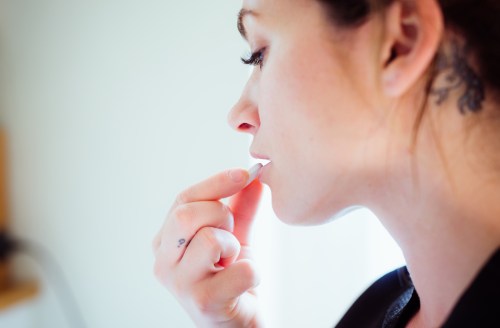Why you should be skeptical of natural products claiming to treat COVID-19
Don't believe coronavirus natural treatment scams. The Food and Drug Administration says tinctures, teas, and supplements are not to be believed

With confirmed cases of COVID-19 in 34 states, a host of natural “wellness” companies are attempting to capitalize on public fear by advertising products that “cure” or “prevent” the new coronavirus. On Monday, the Food and Drug Administration swiftly replied by issuing warnings to seven companies with one resounding message: Stop making false claims; there’s no “natural treatment” for the virus.
The seven companies warned—including GuruNanda, Vivify Holistic Clinic, and Herbal Amy—have been given a 48 hours to correct their violations before facing legal consequences. Herbal Amy, for example, is selling (ineffective) “Coronavirus Protocol” for the steep price of $150. Vivify, meanwhile, sells a tea made to drink six times a day that purports to offer “antiviral action” (but does not).
The FDA—along with the Federal Trade Commission and Department of Justice—wants to make sure that false advertising doesn’t sway people from getting the treatment they need and deserve. “There already is a high level of anxiety over the potential spread of coronavirus,” said Joe Simons, chairman of the FTC, in the statement released to the New York Times. “What we don’t need in this situation are companies preying on consumers by promoting products with fraudulent prevention and treatment claims.”
“What we don’t need in this situation are companies preying on consumers by promoting products with fraudulent prevention and treatment claims.” —Joe Simons, chairman of the Federal Trade Commission
Attorney General William P. Barr echoed the sentiments of the FTC in a similar statement. “The Department of Justice stands ready to make sure that bad actors do not take advantage of emergency response efforts, health care providers, or the American people during this crucial time,” he said. In other words, right now is not the time to believe every immunity buzzword you see on product labels—it’s time to consult the experts and read up on what we actually know (and don’t know) about COVID-19.
To help you do just that, several online resources—like the World Health Organization’s Pinterest board dedicated to COVID-19—make factual, virus-related information widely accessible. And since as of now there’s no vaccine or cure for COVID-19, a lot of that information revolves around smart cleanliness practices like washing your hands, using hand sanitizer, avoiding touching your face, and staying home from work if you feel unwell.
“The simplest and most straightforward public health measures, if applied aggressively and persistently over time, have shown…the disease can be brought under control,” said Michael Ryan, MD, executive director of WHO Health Emergencies, at the WHO briefing. For now, make sure to scan the FTC’s full list of products under scrutiny, and continue to interrogate the coronavirus intel coming your way.
For the most up-to-date information on COVID-19, continue to check on the FDA’s news releases and Twitter feed, consult the WHO’s public advice for the coronavirus, and talk to your primary health care provider.
Here’s what your fitness studio is doing about COVID-19, and why you really shouldn’t be buying face masks.
Sign Up for Our Daily Newsletter
Get all the latest in wellness, trends, food, fitness, beauty, and more delivered right to your inbox.
Got it, you've been added to our email list.










